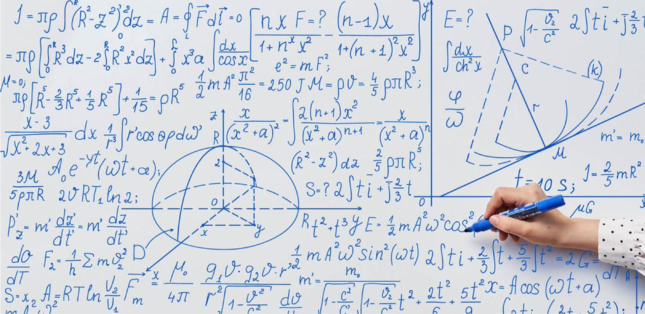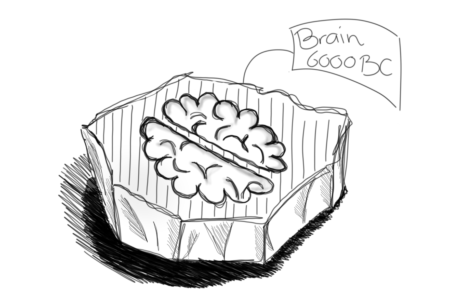The math gene investigated
What’s the circumference of a circle? Or the square of sixteen? Such questions are really exciting to some people, but stressful to others. “I can’t do math” is an expression that’s all too common. Either you get it, or you don’t. But to what extent is a math level actually fixed?
For 40 years Wim Grosheide worked as a mathematics teacher at the Hermann Wesselink College in Amstelveen. “I studied Physics. But I wasn’t very good at it”, he laughs. “So I went into teaching.”
In his four decades, Grosheide has seen every type of math student. “It’s clear that everyone has their own talents.” And so did he. “I could never cram history dates, but formulas went just fine.”
Brain blueprints
Where this difference in aptitude comes from, is hard to define. Neuroscientists agree that genetics play a role, but still unclear is how far this influence works. A groundbreaking research in this area was done in 2020 by the Max Planck Institute in Germany.
The researchers looked at ROBO1: a gene responsible for brain development. “ROBO1 essentially has the blueprints to the brain and tells cells where to settle down”, says Michael Skeide, the study’s first author.
ROBO1 has three variations: everyone has one. The researchers focused on one of its variations and looked at the brains of 101 three to six-year-old children who hadn’t had any formal math training yet. They found that ROBO1 is associated with the volume of the right parietal cortex, a region that’s key for quantity representation. Did this volume then predict individual performance?
When the children were between seven and nine years old and were being taught math in school, the researchers looked at their individual levels. As it turned out: the ROBO1 variation is correlated to a larger right parietal cortex and to better math performance.


Abacus or ballpit
“But”, Skeide warns, “it’s really difficult to link genetics to behavior: environment also plays a role.” Take for instance the way in which parents talk about math, which shapes a child’s attitude from a young age. “We can try to disentangle the contributions of genes and environmental factors, but actually those are theoretical abstractions. In reality, the two always work together.”
An example is the gene-environment correlation: your genetics influence the environment you’re attracted to. So a child with ‘mathematical’ genes will be more drawn to numbers and abstractions: rather an abacus than a ball pit. Most likely the child will later be good at math, but whether that’s due to genes or environment is impossible to say.
Also, ROBO1 is not a ‘math gene’, it just influences brain development. “We then link that to math, but the label ‘mathematics’ is something we made up ourselves.”
Math is a sum
To this Dietsje Jolles agrees, assistant professor at the Institute of Education and Child Studies at Leiden University. “Math is not one thing, it’s a sum of many. Spatial awareness, pattern recognition, factual knowledge, and so on.”
These are actually evolutionary mechanisms: to see for example that a large group of lions is more dangerous than a small one. “We started challenging our brains more and more, but in essence this is where math comes from.”
Jolles could see these different components in her research on children’s math skills. For a period of eight weeks, her team gave a math course to children between seven and nine years old, and observed how their brains developed during the course. “What we see is that not particularly one brain area becomes more active, but that various areas start working together better.”
This also means that being ‘bad at math’ can have multiple causes. If you struggle with one component, the entire process can come to a halt. “I really recognize that in my students”, says math teacher Grosheide. “One might be a quick thinker, but doesn’t know the rules. Another knows all the rules, but can’t apply them.”
Amend or accept?
Getting better at math, then also looks different for everyone. One might have to cram facts, another might need to develop spatial awareness. Jolles is optimistic: “The brain is plastic, so there’s a lot possible.”
But can a bad predisposition be completely compensated by practice? Skeide is doubtful. He tells about the fall back effect: after a math course people fall back to their initial level. “To really compensate for a bad predisposition”, he says, “you would have to keep studying your entire life.”
Jolles has a different point of view. “I understand him saying that, but I do think there’s a nuance. Some skills are like riding a bicycle: once learned, you don’t forget them.” For the more time-sensitive skills, spaced repetition could be a solution. “If you revise the material in intervals, you can prevent it from slipping away.”
Pretty booklet
Grosheide has a different approach in his lessons: he’d rather prevent than cure. “Compensating for a bad predisposition is possible, but difficult. I find it more important that students develop a good association with math early on.”
To do so, Grosheide developed his own teaching program for middle schoolers: Math Without Books. It entails digital modules and practical assignments. Students create their own booklets, videos and posters on mathematical topics. “This way, to a student who struggles with math, you can still say: “What a pretty booklet!” So you can give it a positive spin.”
And that positive spin really matters: multiple studies have shown that a positive attitude induces better results, whereas a negative attitude results in the opposite. Especially students with bad associations to math, tend to hold onto this association. “I can’t do math” is the type of thinking that follows.
To give children a positive association to math, Grosheide believes society should alter its own ideas. The notion that math is for nerds, makes the field unappealing. And the idea that math relates to intelligence, gives students too much pressure. “If you fail history, you just didn’t study enough. But if you fail math, you feel dumb. That’s ridiculous.” And to change our collective attitude, the media play a crucial role.






0 Comments
Add a comment